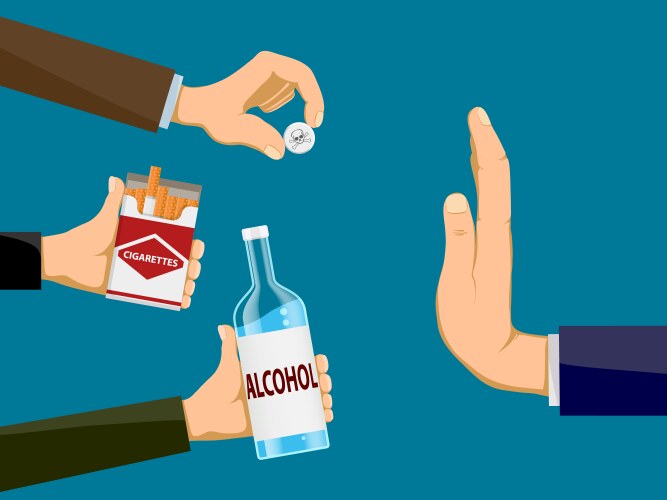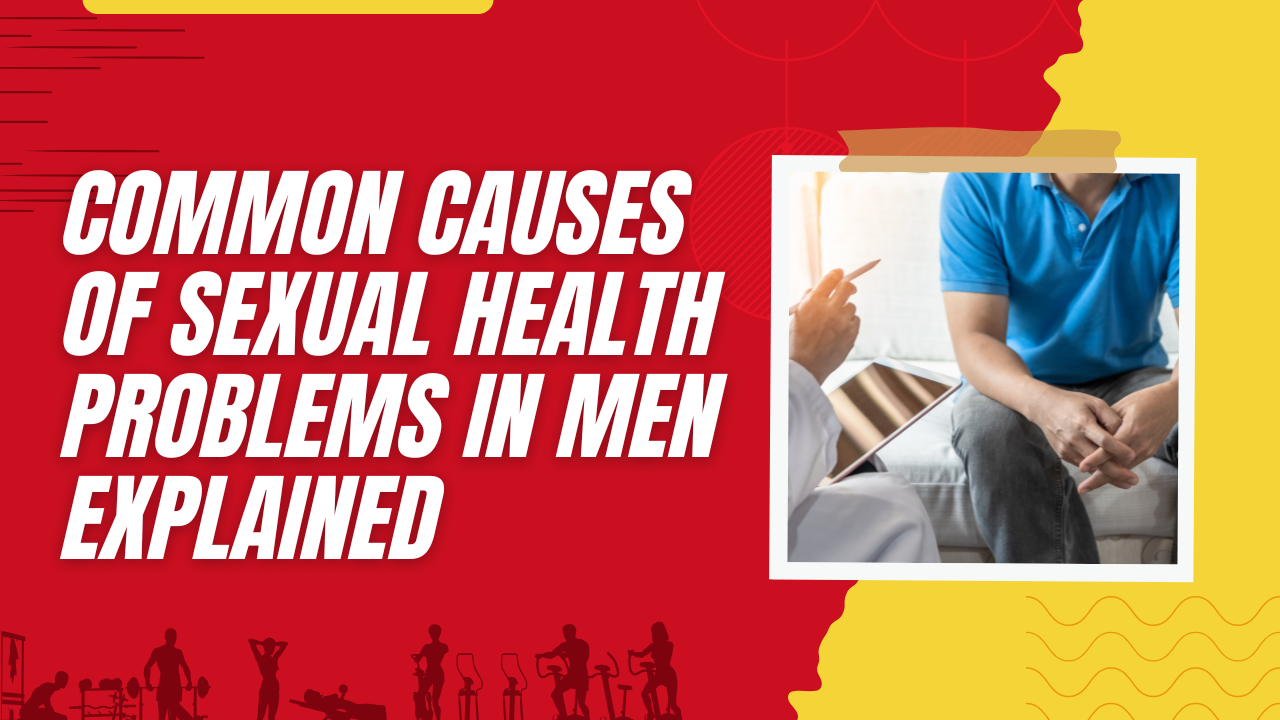Sexual health is often seen as a sensitive subject, especially for men. Cultural pressures, societal expectations, and personal embarrassment can make it hard for many men to talk openly about these issues. However, sexual health is about more than just performance—it reflects both physical and emotional well-being. Problems in this area may point to deeper health concerns that need attention.
Many men experience sexual dysfunctions without realizing the impact until it affects their self-esteem, relationships, and overall happiness. Conditions like erectile dysfunction (ED), low libido, and premature ejaculation (PE) are more common than many think. These problems can be influenced by a mix of physical factors, such as poor blood flow or hormone levels, and psychological factors like stress, anxiety, or depression.
In this article, we’ll explore the most common causes behind men’s sexual health problems. We will also look at how lifestyle choices, such as diet, exercise, and stress management, can influence sexual wellness, and share strategies for improving sexual health.
The Importance of Sexual Health for Men

Sexual health plays a key role in a man’s overall well-being, affecting his physical, mental, and emotional health. When sexual difficulties arise, they can lead to feelings of frustration, low self-esteem, and even depression. These struggles can create emotional stress that impacts other areas of life, making it important to address them early.
Persistent sexual health problems can also affect relationships. Issues like erectile dysfunction (ED) or low libido can lead to a lack of intimacy between partners, causing emotional distance and misunderstandings. Over time, this can weaken the bond between partners and add more stress to the relationship.
Although sexual health issues are often linked to aging, they are not limited to older men. Men of all ages can experience problems, whether due to physical health conditions, lifestyle habits, or psychological factors. Recognizing this can help men feel less isolated and more willing to seek support.
It is important to understand that sexual health is not just a physical matter. Psychological factors such as stress, anxiety, or depression can contribute to sexual problems. Identifying the true causes is essential for finding the right treatment and improving overall health.
Common Sexual Health Problems in Men
Men experience a range of sexual health problems, many of which are closely connected. Understanding these issues is important for proper care and treatment. In the following sections, we will take a closer look at the most common sexual health challenges that men face and how they can affect overall well-being. Let’s explore the most common issues in detail:
- Erectile Dysfunction (ED)
Erectile dysfunction is one of the most common sexual health challenges faced by men across the world. It is the consistent difficulty in getting or keeping an erection firm enough for sexual activity. While occasional trouble is normal, frequent ED can deeply affect a man’s confidence, cause emotional stress, and impact relationships. It may be linked to physical health problems like poor blood flow or to emotional struggles like stress and anxiety.
- Low Libido
Low libido, or a reduced interest in sexual activity, is another major concern for men’s sexual health. Many factors can lead to a decrease in sexual desire, including high stress, depression, hormonal changes, fatigue, or the use of certain medications. Low libido can cause emotional distance in relationships and often leads to frustration for both partners. Recognizing and addressing the underlying cause is important for rebuilding intimacy and connection.
- Premature Ejaculation (PE)

Premature ejaculation happens when a man ejaculates much sooner during sexual activity than he or his partner would like. It often occurs with little sexual stimulation and can leave both partners feeling unsatisfied. While occasional early ejaculation is common and not a cause for concern, regular or uncontrollable episodes may point to psychological factors such as anxiety or physical factors like inflammation, requiring careful management.
- Delayed Ejaculation
Delayed ejaculation is the difficulty or inability to reach orgasm and ejaculate even after prolonged sexual activity. This condition can lead to frustration, stress, and even avoidance of sexual intimacy. Causes can include emotional challenges like anxiety, relationship problems, side effects from medications, or underlying medical issues. Proper treatment often depends on understanding whether the problem is primarily physical, psychological, or a combination of both.
- Infertility
Male infertility refers to a man’s inability to cause pregnancy in a fertile female partner. It is often related to problems with sperm production, sperm quality, or sperm movement. Infertility can be an emotionally painful experience, leading to feelings of guilt or inadequacy. However, it’s important to understand that male infertility is common and can result from many reasons, such as genetic conditions, hormonal imbalances, or health issues, many of which can be managed with medical help.
The Root Causes of Sexual Health Problems in Men
Sexual health problems in men can arise from many different causes. Some are linked to physical health, while others are connected to emotional or psychological factors. Understanding these causes is important for proper treatment and prevention. Below, we will take a closer look at the most common reasons behind sexual dysfunction and how they can affect men’s health. Below, we explore the most common root causes of sexual dysfunction in men:
Physical Causes
Cardiovascular Health
The heart and blood vessels are very important for healthy sexual function. Proper blood flow is needed to achieve and maintain an erection. Conditions like atherosclerosis (hardening of the arteries), high blood pressure, and high cholesterol can restrict blood flow to the penis. When blood flow is limited, it becomes difficult to get or keep an erection, often leading to erectile dysfunction (ED). In many cases, ED can even be an early sign of heart problems.
Hormonal Imbalances
Testosterone is the key hormone that drives sexual desire and function in men. When testosterone levels drop, often called “Low T,” men may notice a strong decrease in libido, lower energy levels, and problems with sexual performance. Besides testosterone, other hormones like those produced by the thyroid, or high levels of cortisol (the stress hormone), can also disturb sexual health. Balancing hormone levels is important for maintaining a healthy and satisfying sex life.
Obesity and Metabolic Disorders
Carrying excess body weight, especially around the abdomen, can have a serious impact on sexual health. Obesity can lower testosterone levels, reduce healthy blood flow, and raise the risk of heart and blood vessel problems. Metabolic syndrome—a group of conditions including high blood pressure, high blood sugar, and unhealthy cholesterol levels—also increases the chance of developing erectile dysfunction and other sexual problems. Managing weight and metabolic health can greatly improve sexual function.
Diabetes
Diabetes affects the body’s ability to control blood sugar and can cause damage to blood vessels and nerves over time. Healthy blood flow and nerve function are both essential for sexual activity. Men with diabetes are much more likely to suffer from erectile dysfunction because of these complications. Managing blood sugar levels carefully is crucial for protecting both overall health and sexual performance.
Neurological Conditions
Neurological diseases can directly interfere with the nerve signals needed for sexual response. Conditions like Parkinson’s disease, multiple sclerosis (MS), and injuries to the spinal cord can all affect the connection between the brain and the genitals. This disruption can make it difficult to achieve arousal, maintain erections, or even feel normal sensations during sexual activity. Treating or managing these conditions is important for supporting sexual health.
Medications and Treatments
Many common medications used to treat other health issues can have side effects that impact sexual health. Drugs prescribed for high blood pressure, depression, anxiety, or prostate problems may cause erectile dysfunction, lower sexual desire, or delay ejaculation. If medication is suspected to be the cause of sexual issues, it’s important to speak with a healthcare provider about possible alternatives or adjustments.
Psychological Causes

While physical problems are important, psychological factors also have a strong effect on sexual health. Stress, anxiety, and depression are some of the most common emotional issues linked to sexual dysfunction. These mental health challenges can lower desire, affect performance, and create a cycle of ongoing sexual health problems.
Stress and Anxiety
Performance anxiety is one of the most common psychological causes of erectile dysfunction (ED) and premature ejaculation. Men often worry about their ability to perform sexually or fear that they might not satisfy their partner, leading to stress and anxiety. Over time, this anxiety can create a negative cycle where worries about performance reduce confidence, which in turn can lead to further issues with sexual function. The constant pressure to “perform” can make it difficult to enjoy intimacy, and the fear of failure can worsen sexual health problems.
Depression
Depression can have a significant impact on sexual health by reducing both libido and energy levels. Men struggling with depression often experience a decrease in sexual desire and may feel uninterested in or disconnected from sexual activities. The emotional and physical fatigue caused by depression can make it difficult to engage in intimacy, creating a vicious cycle where the lack of desire further contributes to feelings of frustration, isolation, and low self-worth. Addressing mental health issues is key to restoring sexual health and overall well-being.
Relationship Problems
Relationship dynamics play an essential role in sexual health. A lack of communication, unresolved conflicts, or emotional disconnection can all contribute to sexual health issues. When there is a breakdown in trust, intimacy, or emotional support, sexual desire often diminishes. Unresolved issues between partners may lead to feelings of anxiety or inadequacy during sexual activity, which can negatively impact performance and decrease libido. Improving communication and addressing relationship concerns can be essential steps in improving both emotional and sexual well-being.
Lifestyle Factors
Lifestyle choices can significantly affect sexual health. Habits like smoking, heavy alcohol consumption, poor diet, and lack of exercise can contribute to sexual dysfunction. On the other hand, healthy habits such as regular physical activity, balanced nutrition, and reducing harmful substances can improve sexual function and overall well-being.

Smoking
Smoking is one of the leading contributors to poor sexual health. Nicotine, the active substance in cigarettes, constricts blood vessels, which restricts the flow of blood to the penis—something essential for achieving and maintaining an erection. Over time, this reduced blood flow can result in erectile dysfunction (ED). Smoking can also damage the blood vessels, further affecting circulation, and negatively impacting overall sexual function. Quitting smoking can improve circulation and restore sexual health.
Excessive Alcohol Consumption
While a small amount of alcohol can help some people relax, excessive alcohol consumption can seriously impair sexual performance. Alcohol is a depressant, which means it can lower testosterone levels and hinder the body’s ability to achieve or maintain an erection. Chronic heavy drinking can also lead to long-term sexual dysfunction, contributing to issues like reduced libido and erectile problems. Moderating alcohol intake is important for maintaining healthy sexual function.
Diet and Nutrition
A poor diet filled with unhealthy fats, processed foods, and excessive sugars can lead to obesity, diabetes, and cardiovascular issues—conditions that are all risk factors for sexual health problems. These health issues can lead to reduced blood flow, hormone imbalances, and other complications that negatively affect sexual performance. On the other hand, a balanced diet with nutrient-rich foods such as fruits, vegetables, whole grains, and healthy fats can enhance sexual function. It helps by improving circulation, balancing hormones, and reducing inflammation, all of which are crucial for maintaining healthy sexual performance.
Physical Inactivity
A sedentary lifestyle is another factor that negatively impacts sexual health. Lack of physical activity can lead to poor circulation, weight gain, and low energy levels—all of which affect sexual function. Regular exercise, however, improves cardiovascular health, boosts testosterone levels, increases energy, and reduces stress. Exercise also promotes better mental health, which can have a positive impact on libido and sexual performance. Staying active is key to supporting overall sexual health.
Sleep Disorders
Sleep is a vital component of overall health, including sexual function. Conditions like sleep apnea and insomnia, which disrupt sleep quality, can have a detrimental effect on sexual health. Poor sleep can lead to reduced testosterone levels and increased levels of stress, both of which are linked to sexual dysfunction. A lack of rest can also affect mood and energy levels, further complicating sexual health. Ensuring a good night’s sleep and addressing any sleep disorders can help maintain healthy testosterone levels and improve sexual well-being.
How to Address Sexual Health Problems in Men
Addressing sexual health issues requires a comprehensive approach that considers both physical and psychological factors. It’s important to not only focus on underlying physical conditions but also address emotional and mental health concerns. A balanced strategy that includes medical treatment, lifestyle changes, and mental health support can improve overall sexual health.
Medical Treatments
Depending on the cause, treatment options may include:
Medications
Medications such as Viagra, Cialis, and Levitra are commonly prescribed for erectile dysfunction (ED). These drugs work by improving blood flow to the penis, making it easier to achieve and maintain an erection. They are effective for many men, but it’s important to consult a doctor to ensure they’re suitable, as they can interact with other medications or health conditions.
Hormone Therapy
For men with low testosterone levels, hormone replacement therapy (HRT) may be recommended. Testosterone is essential for sexual drive and performance, and low levels can contribute to reduced libido, fatigue, and sexual dysfunction. HRT involves supplementing testosterone to help restore normal levels, which can improve sexual health and overall well-being. This option should be discussed with a healthcare provider to understand the potential benefits and risks.
Psychotherapy
For sexual health issues with psychological roots, such as anxiety, depression, or relationship challenges, therapy can be highly effective. Cognitive behavioral therapy (CBT) is commonly used to help men address negative thought patterns and manage stress, while couples counseling can improve communication and intimacy. Both types of therapy can reduce the mental barriers to sexual health, helping men regain confidence and resolve underlying emotional issues.
Vacuum Pumps or Implants
In more severe cases of erectile dysfunction, when medications or therapy may not be enough, mechanical devices like vacuum pumps or penile implants can be an option. A vacuum pump creates a vacuum around the penis to draw blood into the area, helping achieve an erection. For those who do not respond to other treatments, penile implants, which are surgically placed inside the penis, can provide a permanent solution for erectile dysfunction, allowing men to regain sexual function.
Lifestyle Modifications

Quitting Smoking
Quitting smoking is one of the most effective ways to improve sexual health. Nicotine constricts blood vessels, which can limit blood flow to the penis and impair erectile function. By stopping smoking, circulation improves, and some of the damage caused by nicotine to the blood vessels can begin to reverse. Over time, this can lead to better overall cardiovascular health, which is essential for sexual function.
Exercising Regularly
Regular physical activity, including a combination of cardiovascular exercises and strength training, plays a crucial role in enhancing sexual health. Cardiovascular exercises like running, cycling, and swimming improve heart health and blood circulation, which are vital for erectile function. Strength training helps boost testosterone levels, the key hormone for male sexual drive. Additionally, exercise is a powerful stress reliever, which can lower anxiety and enhance overall mood, making it easier to maintain a healthy sex life.
Eating a Balanced Diet
A well-balanced diet is crucial for maintaining good sexual health. Consuming a variety of nutrient-rich foods, such as fruits, vegetables, whole grains, lean proteins, and healthy fats, supports optimal hormone production and helps improve blood circulation. Eating a healthy diet also promotes a healthy weight, which is important for managing conditions like diabetes, obesity, and high blood pressure—common contributors to sexual health issues. A nutritious diet can also reduce inflammation in the body, which supports overall health and sexual function.
Managing Stress
Chronic stress can have a significant negative impact on sexual health, as it can lead to anxiety, reduced libido, and erectile dysfunction. Managing stress through techniques such as meditation, yoga, or deep-breathing exercises can help reduce mental and emotional tension. These practices promote relaxation and improve mental well-being, leading to better focus, improved sexual desire, and enhanced performance. Regular stress management is essential for maintaining both mental health and sexual health.
Conclusion
Sexual health problems are common among men, but they don’t have to define your life. By understanding the physical, psychological, and lifestyle factors behind these issues, you can take proactive steps to improve your sexual health. Whether the cause is medical, emotional, or related to lifestyle choices, there are effective ways to manage and address these problems.
Seeking help from a healthcare provider is an important step in addressing sexual health concerns. It’s not a sign of weakness, but rather an indication that you’re taking control of your health. A healthcare professional can help identify the root causes of your issues and recommend appropriate treatment options, such as medication, therapy, or lifestyle adjustments.
By Targeting sexual health problems head-on, you can regain your confidence and improve your quality of life. With the right approach, you can experience a fulfilling and healthy sex life, enhancing both your emotional well-being and overall health.
FAQs
- What are the most common causes of sexual health problems in men ?
Sexual health problems in men can stem from physical factors (like cardiovascular disease, diabetes, and hormonal imbalances), psychological factors (such as stress, anxiety, or depression), and lifestyle choices (like smoking, alcohol consumption, and lack of exercise). Often, a combination of these factors contributes to sexual dysfunction. - How can stress and anxiety affect a man’s sexual health ?
Stress and anxiety can lead to performance anxiety, which may cause erectile dysfunction (ED) or premature ejaculation (PE). The pressure to perform sexually can worsen the problem, creating a cycle of stress that further affects sexual performance. Additionally, chronic stress can lead to hormonal imbalances and reduced libido. - What role does age play in sexual health problems for men ?
As men age, they may experience a natural decline in testosterone levels, which can lead to reduced libido and erectile function. Older men are also at higher risk for conditions like cardiovascular disease, diabetes, and neurological disorders, all of which can contribute to sexual dysfunction. However, age is not the only factor—many older men maintain a healthy sex life with proper care and attention to their health. - Can poor lifestyle choices lead to sexual health problems ?
Yes, poor lifestyle choices like smoking, excessive alcohol consumption, a poor diet, and lack of exercise can contribute to sexual health issues. Smoking restricts blood flow, alcohol can reduce sexual performance, and a sedentary lifestyle leads to poor circulation and obesity—all of which can negatively impact sexual function. - What treatments are available for sexual health problems in men ?
Treatments for sexual health problems depend on the underlying cause. Options include medications (like Viagra or Cialis for erectile dysfunction), hormone replacement therapy for low testosterone, psychotherapy for stress or anxiety-related issues, and lifestyle changes such as exercise, diet improvements, and quitting smoking. In severe cases, devices like vacuum pumps or penile implants may be recommended. It’s best to consult with a healthcare provider for a personalized treatment plan.


